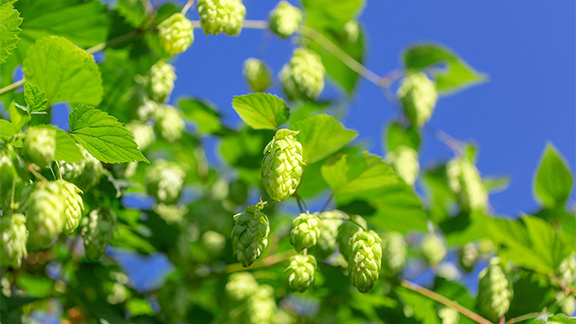9 Reasons Organic Coffee Is Healthier For You
Posted by Ooo La Lattes on 3rd Jul 2022
Updated: 6th of July 2024
The best organic coffee brands are becoming increasingly popular for a variety of reasons. Not only does organic coffee taste better, but it also offers numerous health benefits that make it a far superior choice to conventional coffees. From improved soil and water conservation to higher levels of antioxidants, organic coffee has some impressive advantages that are worth considering. Here are nine reasons why organic coffee is healthier than non-organic varieties.

1. Overview of Organic Coffee and Its Potential Health Benefits
Organic coffee is produced from beans grown under organic farming regulations, meaning they are free from synthetic chemicals, fertilizers, pesticides, and other pollutants. This results in a cleaner, healthy coffee, as these substances can have an impact on the flavor and nutrition of the finished product.
Organic coffee is also more sustainable and environmentally friendly than conventional coffees, as it is grown without relying on chemical inputs that can damage soil health.
When it comes to health benefits, organic coffee offers numerous advantages. Since no chemicals used to grow organic coffee, it contains higher levels of antioxidants than non-organic varieties. These compounds help protect cells against damage caused by oxidative stress, which can reduce inflammation in the body and promote overall health. Organic coffee also has been shown to have higher concentrations of certain minerals and vitamins that can improve human health.

In addition to its beneficial antioxidant content, organic coffee is also healthier for your heart. Studies suggest that organic coffees may help lower cholesterol levels and reduce the risk of cardiovascular disease due to their high levels of polyphenols—compounds found naturally in plants that offer protective benefits against coronary heart disease. Research also suggests that consuming organic coffee regularly may help reduce stress levels and improve mental clarity due to its calming effect on the nervous system.
Organic coffee is also likely better in the long run since it requires less maintenance than conventional varieties when growing. As organic crops require fewer resources such as water, fuel, power, and labor during production stages than conventional ones do, there’s less waste associated with them overall.
This means farmers don’t have to spend as much money on inputs like fertilizer or pesticides while still producing a quality product they can be proud of—allowing them to pocket more profits per crop at market prices than otherwise possible with conventional production methods.
Finally, choosing organic products helps support small-scale people who use natural resources responsibly by avoiding synthetic inputs that are damaging for both people and the planet alike—ensuring a much brighter future for generations ahead! With so many reasons why switching to an organic cup of joe makes sense all around, why not give healthy organic coffee a try today?
2. Improved Soil and Water Conservation With Organic Coffee Beans
Organic coffee production is an environmentally friendly and sustainable farming practice that conserves soil and water resources. It does this by avoiding the use of synthetic fertilizers, pesticides, and other pollutants, which can cause damage to soil health over time. Organic coffee also requires fewer inputs overall during the production process such as water, fuel, power, and labor—resulting in less waste associated with organic farming practices compared to conventional methods.
When organic coffee is grown without relying on chemical inputs, it helps nourish the soil and maintain its natural structure by encouraging organic matter retention. The organic compounds that make up organic matter are essential for maintaining healthy soils, as they improve nutrient cycling, act as a natural fertilizer for plants, and increase microbial activity within soils.
In addition to improving overall soil composition, organic coffee also helps retain more moisture in the soil by reducing surface runoff. This keeps more water in the plant root zone—allowing organic crops to grow better while conserving water resources at the same time.

Organic coffee production also reduces pollution from runoff caused by chemicals used in conventional farming practices. When synthetic fertilizers and pesticides are applied during growing periods, they can leach into nearby bodies of water and contaminate them with hazardous substances like nitrates or phosphates—causing serious environmental problems for aquatic life downstream.
By avoiding these inputs altogether with organic farming techniques, organic coffee growers help protect local ecosystems from contamination while cutting back on their own costs related to buying synthetic fertilizers or pesticides too!
Finally, organic coffee farming is beneficial for local communities in terms of providing jobs and generating income through fair trade coffee practices that ensure small-scale workers are paid a living wage for their work. This helps keep rural communities alive while also promoting sustainable development projects such as infrastructure improvements or educational initiatives that further benefit these regions in long-term ways beyond just producing high-quality organic coffees too!
In summary, organic coffee production offers numerous advantages when it comes to both soil and water conservation. Not only does it reduce environmental pollution from harmful chemicals used in conventional agriculture but it also improves overall soil composition while retaining more moisture within root systems—allowing organic crops to thrive without wasting precious resources like water or energy in the process! Furthermore, organic farms offer much-needed economic benefits for local communities through fair trade practices that ensure small-scale workers get paid fairly for their efforts—making organic coffees one of the best choices all around when it comes to sustainability and healthfulness alike!
3. Higher Levels of Antioxidants In Organic Coffee Compared To Conventional Varieties
Organic coffee is known for its superior flavor and benefits, but many don't realize that organic varieties also contain higher levels of beneficial antioxidants than conventional alternatives. This is because organic farming methods are designed to promote soil health and fertility—allowing organic crops to absorb more nutrients from the earth while avoiding the use of synthetic fertilizers and pesticides that can strip soils of vital minerals.
As a result, organic coffees are packed with beneficial compounds such as flavonoids, polyphenols, and other antioxidants which have been linked to various benefits including improved heart function, better cognitive performance, and increased energy levels.
In comparison to non-organic coffees, organic varieties consistently show higher levels of antioxidant activity in laboratory tests due to their organic farming methods. For example, one study found that organic Arabica beans had up to 4 times more total flavonoid content than conventional Arabica beans.
Another analysis looked at the antioxidant capacity of both organic and non-organic coffees and concluded that organic samples had significantly higher levels of antioxidant properties compared to the conventional ones—demonstrating again just how much more nutritious organic coffee can be!
Not only does organic coffee offer higher levels of antioxidants compared to conventional varieties, but it also contains fewer harmful chemicals due to its strict production methods. Conventionally grown coffees are often treated with chemical fertilizers or pesticides during production which can linger on plants long after harvest—leaving dangerous residues behind that could potentially be ingested by consumers. In contrast, organic farming practices do not allow for any synthetic inputs which help reduce chemical contamination in food products like coffee while still allowing crops plenty of access to necessary nutrients needed for optimal growth too!
Overall, organic coffees provide a healthier choice when it comes to drinking coffee because they contain higher levels of beneficial antioxidants as well as fewer contaminants from synthetic inputs used in non-organic production processes. These superior nutrition qualities are just one reason why many prefer organic over traditional types—making it worth considering if you're looking for a flavorful cup while also wanting something healthy too!

4. There's No Exposure To Chemicals or Pesticides With Organic Coffee Brands
Organic coffee is a great choice for those looking for a healthier option, as organic production methods eliminate the use of potentially harmful chemicals and pesticides that can linger on the beans after harvest. Organic farming practices focus on natural solutions to control pests and improve fertility in soils, which helps protect organic crops from contamination by hazardous synthetic inputs used in conventional coffee cultivation processes. This means organic coffee drinkers can be sure they aren’t ingesting any toxic chemicals with their morning cup of joe.
Moreover, farmers often prioritize sustainability when it comes to managing their operations. This includes avoiding the use of chemical fertilizers that can deplete soil nutrients and damage beneficial microorganisms in the environment. Organic coffees are grown using organic composts or green manures instead, which provide organic matter to feed beneficial microorganisms while helping retain moisture within root systems—allowing organic crops to thrive without wasting precious resources like water or energy in the process!
Furthermore, organic farming helps reduce environmental pollution from harmful chemicals used in conventional agriculture as well as promotes better soil health—providing further assurance that organic coffees are a safe and sustainable choice for both you and the planet.
Organic production also ensures fair trade coffee practices for small-scale groups involved in growing organic coffees—allowing them to get paid fairly for their efforts while also allowing them to become more economically self-sufficient over time. In addition, organic coffees are known for their superior flavor thanks to higher levels of antioxidants compared to conventional varieties.
This is because organic farming methods are designed to promote soil fertility—allowing organic crops to absorb more essential minerals while avoiding synthetic fertilizers and pesticides that can strip soils of vital nutrients. This means organic coffees are packed with beneficial compounds such as flavonoids, polyphenols, and other antioxidants which have been linked to various benefits including improved heart function, better cognitive performance, and increased energy levels.
Overall, choosing organic coffee is an excellent way to ensure you're providing your body with high quality nutrition without any potential risks from synthetic inputs found in non-organic production systems. Not only does it reduce environmental pollution from harmful chemicals used in conventional agriculture but it also improves overall soil composition while retaining more moisture within root systems—allowing organic crops to thrive without wasting precious resources like water or energy in the process! Furthermore, organic farms offer much-needed economic benefits for local communities through fair trade practices that ensure small-scale farmers get paid fairly for their efforts—making organic coffees one of the best choices for sustainability and healthfulness alike!

5. Better Taste Due To Improved Growing Conditions For Organic Beans
Organic coffee brands have an unmistakable flavor and aroma that can’t be replicated by conventional varieties. This is because organic farms use organic composts or green manures to promote soil fertility instead of synthetic fertilizers which can strip soils of essential minerals. These organic inputs help organic crops absorb more vital nutrients, resulting in higher levels of antioxidants—which are linked to superior taste profiles.
The improved growing conditions also lead to a better cup of joe. Organic methods focus on natural solutions like crop rotation and cover cropping to prevent pest infestations instead of relying on harmful pesticides as conventional farms do. Additionally, organic systems take extra steps to conserve water, energy, and other precious resources while allowing organic crops to thrive without wasting any of the above. This means organic beans are grown with more attention and care than those produced using conventional methods, making them a great choice for those who want an undeniable taste experience.
Moreover, organic coffees tend to be more aromatic than their non-organic counterparts due to their richer nutrient content and lack of synthetic inputs which can dull flavors over time. Organic practices not only promote healthy soil composition but also keep moisture within root systems—allowing organic coffees to hold onto their flavor profiles longer after roasting.
These improved growing conditions also reduce environmental pollution from the hazardous chemicals found in conventional production systems, giving organic coffee drinkers even more assurance that they’re drinking something that’s safe for both themselves and the planet!
Organic coffees are a great choice for those looking for a healthier option as well as exceptional taste experiences alike! They’re produced using organic farming methods that eliminate the use of potentially harmful chemicals and pesticides while also promoting sustainability through better soil health and resource conservation techniques. In addition, organic coffees retain their flavor profile longer thanks to increased antioxidant levels that result from improved growing conditions—allowing organic coffee drinkers to enjoy a truly unique cup of joe every time!
6. Increased Sustainability As Organic Farming Methods Are Better For the Environment
Organic farming methods are superior when it comes to sustainability, allowing organic coffee crops to thrive without wasting precious resources like water or energy in the process. These organic inputs help organic crops absorb more vital nutrients, resulting in higher levels of antioxidants—which are linked to superior taste profiles.
What's more, organic coffee plants tend to require fewer inputs and labor than their conventional counterparts since organic farming focuses on natural solutions like crop rotation and cover cropping in order to prevent pest infestations. This reduces the need for potentially hazardous pesticides that can harm both the environment and human health alike.
Farmers also take extra steps to conserve water and energy while allowing organic crops to thrive without wasting any of these resources. By reducing water consumption, the best organic coffee brands can effectively preserve local waterways from unnecessary pollution caused by overuse and run-off that can be detrimental to fish species, other wildlife, and even nearby communities depending on the source.

Moreover, they use organic composts or green manures to promote soil fertility instead of relying on synthetic fertilizers which can strip soils of essential minerals. As a result of this approach, organic systems generate fewer greenhouse gas emissions while improving overall soil composition—allowing organic coffee plants to retain more moisture within root systems. This not only helps prevent the need for excessive irrigation but also reduces environmental pollution from harmful chemicals used in conventional agriculture practices.
In addition, organic practices provide much-needed economic benefits for local communities through fair trade practices that ensure small-scale farmers get paid fairly for their efforts—making organic coffees one of the best choices all around when it comes to sustainability and healthfulness alike!
By providing stable incomes for local producers, organic farms strengthen economies at a grassroots level as well as protect vulnerable ecosystems from exploitation and destruction due to commercial interests seeking quick profits with reckless disregard for long-term impacts on nature's fragile balance.
All in all, increased sustainability is one of the main benefits associated with organic coffee production since it reduces both environmental pollution from harmful chemicals as well as conserves invaluable resources like water or energy in the process—allowing organic crops to thrive without any potential risks from synthetic inputs found in non-organic production systems.
What's more, these improved growing conditions also lead to a better cup of joe while providing much-needed economic benefits for local communities through fair trade practices that ensure small-scale farmers get paid fairly for their efforts—making organic coffees one of the best choices all around when it comes to sustainability and healthfulness alike!
7. Reduced Risk of Cancer From Drinking Organic Coffee Since It Has No Chemical Residues
Organic coffee is a great choice for coffee lovers who want to reduce their risk of cancer due to its lack of chemical residues. Unlike conventional coffee, organic coffee beans are grown without the use of synthetic fertilizers, pesticides, or herbicides that can contaminate soils and water sources as well as pose health risks for humans. This organic farming also helps organic crops absorb more vital nutrients, resulting in higher levels of antioxidants—which are linked to superior taste profiles and offer added protection from cancer-causing carcinogens.
In addition to organic farming practices, organic coffees also don't undergo any post-harvest treatments that involve potentially hazardous chemicals such as chlorine dioxide which can enter the beverage after processing and lead to an increased risk of certain cancers when consumed.
Farmers of organic coffee must adhere to strict certification protocols in order to meet organic standards and avoid these potential contaminants from entering the supply chain. This means organic coffees generally contain fewer potentially hazardous compounds than conventional counterparts—allowing organic coffee lovers to enjoy their favorite beverage with peace of mind knowing it’s free from harmful substances.
What's more, organic coffees also tend to have higher nutritional value than non-organic brands since they don’t have any artificial additives or preservatives that can strip away essential vitamins and minerals naturally found in coffee beans. These beneficial compounds are known as polyphenols, which include quinic acid, chlorogenic acid, ferulic acid, neochlorogenic acid, and caffeic acid among others—all of which play important roles in preventing certain types of cancers by neutralizing free radical damage caused by environmental stressors like UV radiation from sunlight or air pollution.

Furthermore, organic coffees are often shade grown under natural habitats in tropical climates which provide extra protection against cellular damage as well as support healthy soil composition through natural composts or green manures rather than synthetic fertilizers that can strip soils of essential minerals over time.
This not only allows organic plants access to more nutrient-dense soils but also improves overall quality since organic methods focus on utilizing natural solutions over artificial inputs whenever possible—creating a better cup while reducing the risk of developing cancer due to exposure to potentially hazardous chemicals used during production processes.
When taken together all this evidence suggests that drinking organic coffee may be one way for consumers looking for healthier alternatives when it comes to consuming caffeine without having to worry about any potential health risks associated with consuming chemical residues found in non-organic varieties. By choosing organic options instead, users have access to not only an improved taste profile but also a reduced risk of developing certain forms of cancer due to these safer production practices that eliminate the need for potentially harmful inputs while preserving local ecosystems in the process!
8. How To Support Local By Buying Organic Products, Including Bean Coffee
Supporting certified organic farms is a great way to help local communities while also reducing our environmental footprint. Organic farming practices minimize the impacts of chemical residues that can enter our food supply, protect against soil erosion and degradation caused by synthetic fertilizers, reduce water pollution from pesticides and herbicides, and promote biodiversity by allowing organic crops to thrive in more natural habitats.

When it comes to organic coffee, we can all make a positive impact by choosing certified organic brands whenever possible. Look for organic certifications such as ‘USDA organic’ or ‘Fair Trade Certified’ on labels indicating that the production process was free from harmful chemicals and followed organic standards. Additionally, certified organic coffee beans often come from small-scale family farms instead of large-scale agribusinesses, providing an important source of income for local farmers.
By choosing certified organic brands, we can rest assured that our coffee was grown and processed ethically according to organic production methods. Organic coffees are free from synthetic fertilizers and chemical pesticides or herbicides, helping us to protect the environment by reducing water pollution and soil degradation. This in turn helps promote biodiversity in organic habitats as well as provide support for smallholder farms that depend on organic agriculture for their livelihoods.
Organic coffee is a great way to support locals while also making sure our favorite beverage is safe and healthy to consume. By buying certified organic products, we can help promote organic standards while also protecting the environment and providing much-needed support for organic farmers. So next time you’re in the market for coffee, consider organic certified options to ensure a healthier cup of joe that does good for both people and the planet!
All in all, buying organic products including organic coffee is one way we can help promote organic farming practices while making sure our favorite beverage is safe to consume and supports local farmers around the world. Therefore, when buying organic make sure to look out for organic certifications such as USDA organic or Fair-Trade Certified to make sure your purchase is doing good for both people and the planet!
9. Benefits That Come From Supporting A More Ethical Industry Through Purchasing the Best Organic Coffee Beans
When it comes to organic coffee, the benefits to both people and the planet are undeniable. By choosing certified organic products, consumers can help promote organic standards and support organic farming while reducing the environmental impacts related to pesticide and fertilizer use. This in turn helps minimize soil and water pollution promotes biodiversity in organic habitats, and supports small-scale family organic farming operations.
In addition to these environmental benefits, organic coffees are free from chemical residues that can accumulate in non-organic varieties over time. This means that organic coffee is a healthier choice for those looking to reduce their exposure to potentially harmful chemicals while still being able to enjoy the same great taste they have come to expect from their favorite cup of joe!

By supporting organic coffee with our purchasing power, we can also help ensure a fairer trade system for producers, who often find it difficult to compete with large multinationals that offer lower quality but more cost-effective products. As organic certification requires careful monitoring and verification of production practices throughout the process of growing organically, organic farmers are often able to secure higher prices for their beans which helps them sustain their livelihoods and provide better wages for workers as well as additional resources for their families and communities.
Finally, by choosing organic certified products we can help ensure a more ethical industry overall by sending a strong signal that consumers care about how their food is produced. This not only helps incentivize producers to maintain organic standards but also encourages other producers around the world who may be considering transitioning into organic production methods as well!
All in all, there are countless benefits that come from supporting an ethical industry through purchasing organic coffees such as improved environmental sustainability, reduced risk of exposure to harmful chemicals, support for smallholder farmers working hard towards sustainable agriculture practices, and a healthier cup of joe! So next time you’re shopping for coffee consider opting for organic certified brands - your purchase could make all the difference in helping create a more just and fair global food system!

Conclusion
Organic coffee is a great way to get the same great taste as your favorite cup of joe while also protecting the environment and providing much-needed support for organic farmers. With organic certification standards promoting sustainable production practices, organic coffees are free from chemical residues and offer higher levels of antioxidants than conventional varieties.
Plus, organic coffee comes with some additional benefits such as improved soil and water conservation, no exposure to bad chemicals or pesticides, better taste due to improved growing conditions, increased sustainability as organic farming methods are better for the environment, reduced risk of cancer from drinking organic coffee and more! So next time you’re in the market for coffee consider organic certified options to ensure a healthier cup of coffee and support locals everywhere. By choosing organic, you’re helping to make our world a better place for everyone!
Related Articles
9 Reasons Why (the Right Amount of) Coffee is Good For You
Coffee and Antioxidants: What You Need To Know About the Benefits
What Are the Benefits of Mixing Coffee and CBD Together in the Morning?
Coffee History: The Story of A Merry Cherry











